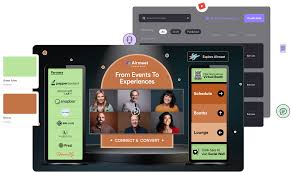Virtual Event Platforms for Conferences
As the world continues to adapt to the challenges of remote work and online events, virtual event platforms have become essential tools for hosting successful conferences. These platforms offer a wide range of features that can enhance the conference experience for both organizers and attendees.
One key advantage of virtual event platforms is their ability to bring people together from different locations without the need for physical travel. This not only saves time and money but also allows for a more inclusive and diverse audience.
Features such as live streaming, interactive sessions, virtual networking, and exhibitor booths make virtual conferences engaging and interactive. Attendees can participate in Q&A sessions, polls, and chat discussions, creating a dynamic environment similar to in-person events.
Virtual event platforms also provide valuable data analytics that can help organizers understand attendee engagement levels, popular sessions, and overall event success. This data-driven approach allows for continuous improvement in future conferences.
In conclusion, virtual event platforms offer a versatile and efficient solution for hosting conferences in today’s digital age. With their interactive features, accessibility, and data analytics capabilities, these platforms are shaping the future of conference experiences worldwide.
Top 8 FAQs About Virtual Event Platforms for Conferences
- What are virtual event platforms?
- How do virtual event platforms enhance conference experiences?
- What features should I look for in a virtual event platform for conferences?
- Can virtual event platforms support interactive sessions and networking opportunities?
- How do virtual event platforms handle registration and attendee management?
- Do virtual event platforms offer data analytics and reporting capabilities?
- Are virtual event platforms secure for hosting conferences?
- What are the cost considerations when choosing a virtual event platform?
What are virtual event platforms?
Virtual event platforms are comprehensive online tools designed to host virtual conferences, trade shows, and other events in a digital environment. These platforms offer a range of features such as live streaming, interactive sessions, virtual networking opportunities, exhibitor booths, and data analytics capabilities. By leveraging technology, virtual event platforms enable organizers to create engaging and immersive experiences for attendees from different locations without the need for physical travel. This innovative solution transforms traditional in-person events into dynamic online experiences that are accessible, interactive, and data-driven.
How do virtual event platforms enhance conference experiences?
Virtual event platforms enhance conference experiences in numerous ways. By offering features such as live streaming, interactive sessions, virtual networking opportunities, and exhibitor booths, these platforms create a dynamic and engaging environment for attendees. Through interactive tools like Q&A sessions, polls, and chat discussions, virtual event platforms foster real-time engagement and collaboration among participants. Additionally, the data analytics provided by these platforms offer valuable insights into attendee behavior and preferences, enabling organizers to tailor future conferences for maximum impact and success. Overall, virtual event platforms revolutionize conference experiences by providing a seamless blend of technology and interactivity that transcends physical boundaries.
What features should I look for in a virtual event platform for conferences?
When considering a virtual event platform for conferences, it is essential to look for specific features that can enhance the overall conference experience. Key features to consider include robust live streaming capabilities to ensure smooth broadcasting of sessions, interactive tools such as Q&A sessions and polls to engage attendees, virtual networking options for fostering connections among participants, exhibitor booths for showcasing sponsors and partners, and data analytics functionalities to track attendee engagement and measure event success. By prioritizing these features in a virtual event platform, conference organizers can create a dynamic and engaging virtual environment that replicates the benefits of in-person events.
Can virtual event platforms support interactive sessions and networking opportunities?
Virtual event platforms are designed to support interactive sessions and networking opportunities seamlessly. These platforms offer a variety of features such as live chat, Q&A sessions, polls, breakout rooms, and virtual networking lounges that enable attendees to engage with speakers, panelists, and each other in real-time. By facilitating interactive sessions and networking opportunities, virtual event platforms create a dynamic and engaging conference experience that mirrors the benefits of in-person events.
How do virtual event platforms handle registration and attendee management?
Virtual event platforms for conferences typically offer robust registration and attendee management features to streamline the process for organizers. These platforms allow organizers to create customizable registration forms, set ticket prices, and manage attendee data securely. Attendees can easily register for the event, receive confirmation emails, and access their personalized event agendas. Organizers can track registrations in real-time, send reminders, and collect feedback post-event. Overall, virtual event platforms simplify registration and attendee management tasks, ensuring a seamless experience for both organizers and attendees alike.
Do virtual event platforms offer data analytics and reporting capabilities?
Virtual event platforms for conferences often come equipped with robust data analytics and reporting capabilities. These features allow organizers to gain valuable insights into attendee behavior, engagement levels, popular sessions, and overall event performance. By analyzing this data, organizers can make informed decisions to improve future conferences, tailor content to audience preferences, and measure the success of their events. Data analytics and reporting capabilities offered by virtual event platforms play a crucial role in enhancing the overall conference experience and ensuring its effectiveness.
Are virtual event platforms secure for hosting conferences?
When considering virtual event platforms for hosting conferences, a frequently asked question is regarding their security measures. Virtual event platforms prioritize the security and confidentiality of conference data by implementing robust encryption protocols, access controls, and monitoring systems. These platforms often offer features such as secure login procedures, data encryption during transmission, and restricted access to sensitive information. Additionally, many virtual event platforms undergo regular security audits and compliance checks to ensure that they meet industry standards for data protection. Overall, virtual event platforms prioritize security to provide a safe and reliable environment for hosting conferences online.
What are the cost considerations when choosing a virtual event platform?
When considering the costs of choosing a virtual event platform for conferences, several factors come into play. These may include the pricing structure of the platform, such as one-time fees, subscription plans, or pay-per-use models. Additional costs to consider are customization options, technical support, and any add-on features that may enhance the conference experience. It is essential to assess the scalability of the platform to accommodate varying numbers of attendees and sessions, as well as any potential hidden costs that may arise during implementation. By carefully evaluating these cost considerations, organizers can select a virtual event platform that aligns with their budget and delivers a successful conference experience for all participants.



